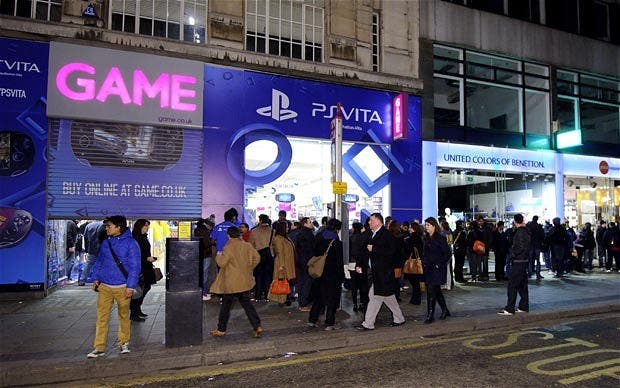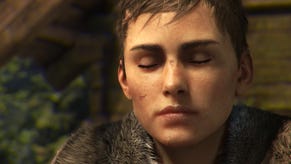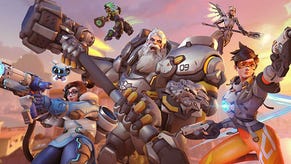Why GAME collapsed
PwC cites "unfortunate" proximity of stores and "ambitious" overseas expansion.
Administrators at PwC have blamed GAME Group's collapse on its "ambitious" overseas expansion and the "unfortunate" close proximity of its stores.
PwC today shut 277 Game and Gamestation stores across the UK and Ireland and announced plans to make 2104 staff redundant by the end of the week. 333 stores are still trading as the administrators seek a buyer for the struggling high street retailer.
It marks the culmination of a torrid 12 months for GAME Group, which has been unable to stock new releases, such as Mass Effect 3, in recent weeks. Its share price fell sharply following a difficult Christmas before GAME was last week forced to cease the trading of its shares on the London Stock Exchange.
So, what went wrong?
"GAME Group had two fundamental problems," PwC valuation manager Mike Jones told Sky News. "First of all there was a very ambitious overseas expansion into seven territories in addition to the UK. On top of that the UK store portfolio is very extensive. Before we made the closures GAME had 610 stores in the UK. That footprint and that high fixed cost is very difficult to maintain."
One store was cannibalising the sales at the other store - PwC valuation manager Mike Jones
GAME's overseas expansion saw it open stores in Scandinavia, Spain, Portugal and Australia, among other territories. Potential buyers are said to be interested in the Iberian business, which is thought to be performing well. The Australian business, which operates independently, is reportedly proving a sticking point with some interested parties.
And then there's the issue of the "unfortunate" close proximity of Game and Gamestation stores, which has in some UK cities and towns seen multiple shops within walking distance of each other.
"The store portfolio this morning consisted of 610 stores," Jones continued. "Part of the reason why GAME has been loss making is because of the high fixed cost in the UK. The restructuring that has been undertaken - and we do of course regret the 2104 job losses - provides GAME has a far more viable fixed cost, and with that it's in a much better position for a purchaser to take on with a view to making substantial profits from a smaller cost base. That's really what we're trying to achieve here."
He added: "Unfortunately, there was a lot of proximity between GAME and Gamestation stores, so one store was cannibalising the sales at the other store. So, through the process of rationalisation, we believe we can both reduce the cost but also ensure the sales that would have been obtained and recorded in one of the closed stores will migrate successfully to one of the existing open stores. So that cannibalisation will not take place and people will actually still shop and the levels of turnover will be maintained on a smaller footprint."
Many gamers will point to GAME and Gamestation's game prices as one of its biggest issues, with competition from rival online retailers, such as Amazon and Play, taking its toll. But Jones played down the impact of online, instead highlighting the importance of bricks and mortar to publisher's relationship with their customers.
"There is a migration to online," he admitted. "Having said that, there's a role for a niche retailer on the high street like GAME. And of course GAME itself, like many physical retailers, also has an online offering. So, while that's part of an evolution, it wasn't necessarily something that GAME wasn't reacting to."
It's much easier to do promotions and marketing activity if people are in store and can touch and feel and see the images from the games themselves.
And, in a nod to the recent midnight launch of PS Vita in GAME and Gamestation, which reportedly saw 61,000 unit sales in the UK, Jones said publishers needed high street stores so gamer's could try before they buy.
"The suppliers of games also are very actively promoting retailers in stores, because it's much easier to do promotions and marketing activity if people are in store and can touch and feel and see the images from the games themselves," he said.
Adding to the debate, Deloitte's Lee Manning said high street retailers needed to change their ways in order to protect themselves during these tough economic times.
"Retail has to change with the times," he said. "It has to face up to the very real challenge of the multi-channel approach, having to deal with the online offering. Stores have to be more than just a place where you can go and buy the product. There needs to be more of a wholesale experience within retail, from the customer's perspective. They need to be able to know exactly what's in the store at that time. They may just use it as a showroom and then buy the product online and have it delivered to somewhere more convenient."
UK shoppers, according to Manning, find themselves with less money than they had in the boom years, when readily available credit fuelled spending sprees. Now, as consumers focus on repaying debt, shops such as GAME are left out in the cold.
"The average consumer family is somewhere between £70 and £150 a month worse off," he said. "That's discretionary spend. That's what's going to be hit. People need to eat. They probably need to heat their houses and have transport. So it's either eating out, entertainment or buying discretionary items, such as clothing, games and other such things, that will suffer.

















































